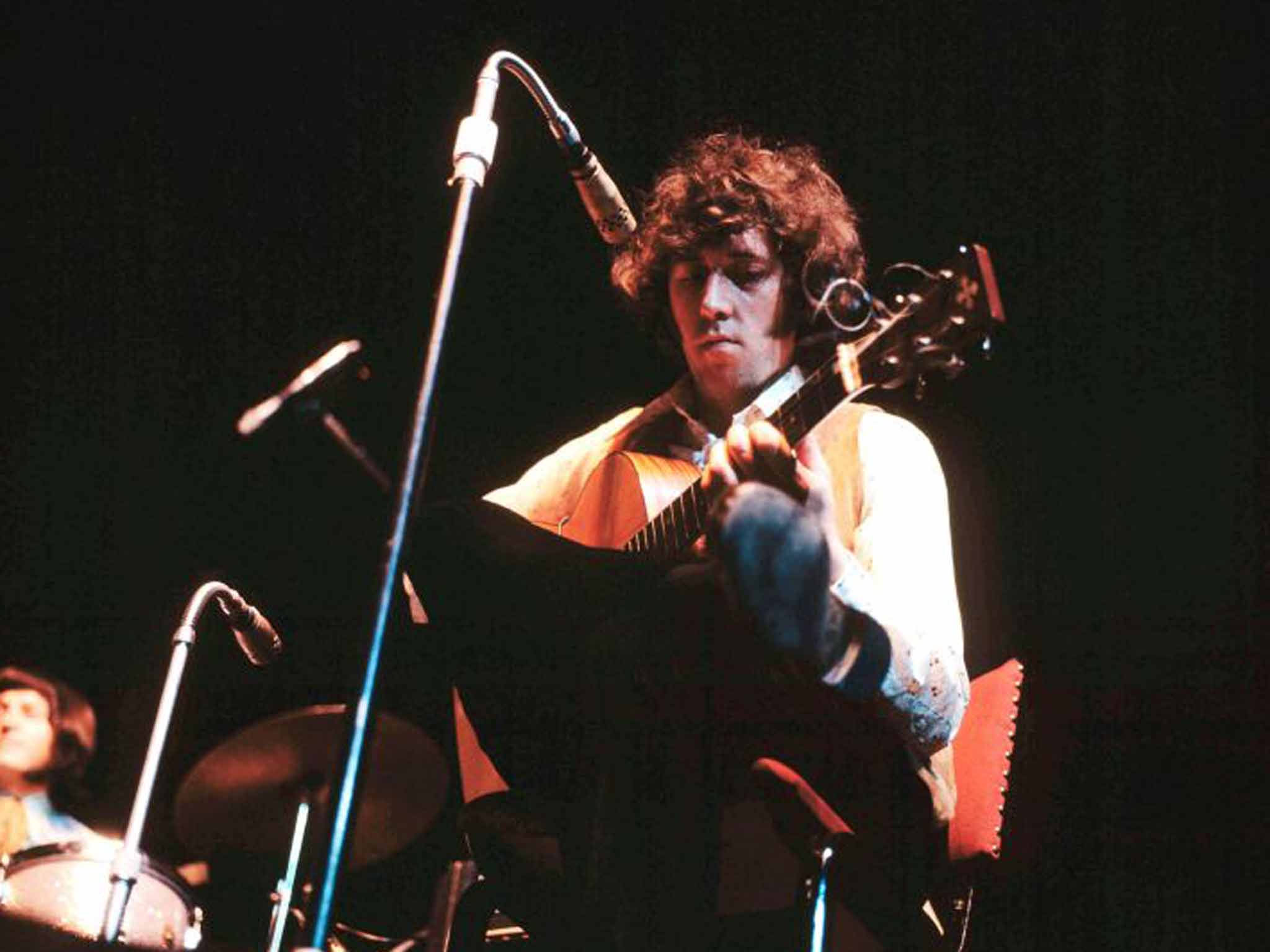Bert Jansch tribute: The scottish Bob Dylan rocks again
At this weekend's Celtic Connections festival, Graham Coxon, Ben Watt and Bernard Butler will pay tribute to Bert Jansch. They tell David Pollock why he was such an inspiration

This October it will have been five years since the guitarist Bert Jansch died of lung cancer at the age of 67 in a Hampstead hospice, and with him went a seismic presence on the British folk scene. Born in Glasgow, raised on Edinburgh's Pilton council estate and eventually settled in London amid the folk explosion of the Sixties, Jansch was “the British Bob Dylan”, a significant influence upon Led Zeppelin in their more folk-influenced moments, a member of Seventies folk supergroup Pentangle, a busker around Europe, a farmer in Wales and a musical touchstone for a generation of guitarists.
Never a demonstrative personality or a courter of cheap celebrity, it might be fair to say that Jansch is remembered in a wider sense more for the quality of the artists who pay him deserved respect than for his own music. Two tribute shows at this month's Celtic Connections festival in Glasgow are cases in point, with a mouth-wateringly starry line-up that includes Led Zeppelin's Robert Plant, Blur's Graham Coxon, sometime Suede guitarist Bernard Butler alongside his frequent collaborator Ben Watt, and Pentangle singer Jacqui McShee.
Butler's recollections sum up the essential appeal of Jansch's vast body of work to musicians. “I first heard Bert in 1993,” he remembers. “As a guitar player it was something I needed to be a part of. I listened to Bert Jansch and Jack Orion (Jansch's 1965 debut and 1966 albums, respectively). It wasn't what I thought to be folk, and it didn't sound as familiar as Dylan or Joni Mitchell or Neil Young. It didn't sound classical either, it was dark, brooding and intense; everything a young guitarist wants.” Watt, a newer convert, calls Jansch “the fault line between folk and rock – bluntness mixed with dexterity, the attack on the strings, dark and light at the same time”.
Coxon is similarly in awe of Jansch, but not unequivocally. “I find the relationship difficult,” he smiles. “I have to stress that I say that very positively.” Introduced to Jansch's music in the early 2000s while exploring the fingerpicking style of playing, Coxon initially found himself turned off by the rawness of the vocals on those early records as he was drawn to the depth and texture of Jansch's playing. “I like raw recordings, of course, but it took me a while to get used to it. It's quite stand-offish, although there's a lot of beauty in there too.”
Jansch's later work brought Coxon a fuller appreciation, especially the vocal on “Reynardine (from the 1971 Rosemary Lane album) and the entirely of 1974's L.A. Turnaround record; produced to sound ”more affectionate“, says Coxon, by ex-Monkee Mike Nesmith. ”It was difficult for me as a crunchy old indie sort of guitar player,“ he says. ”To listen to Bert Jansch is a different language, and although there are moments of magic on all his stuff, it's not all easy listening. But that's how it should be, really. I can say the same about a lot of my favourite people, about Pete Townshend or Bowie. It's not meant to be an easy relationship.“
Both Butler and Coxon's own position allowed them access to Jansch in his final years, the former as a friend and collaborator on his Crimson Moon (2000) and Edge of a Dream (2002) records, the latter when he played a couple of songs during the intermission of a show by Jansch and fellow folk icon Davey Graham at Oxford University's Holywell Music Room. “I just felt fraudulent,” Coxon recalls now. “I couldn't get the b-string into tune, and I was really frustrated. Bert, straight-faced, said, ”You can't tune the b-string.“
I don't quite know what he meant, whether he was just ribbing me or whether [he was saying] 'you really can't'. Personally he was like that – he didn't say very much bar the odd wry comment, but I was over the moon at being able to spend some time with two heroes. I saw Bert as a nice quiet bloke who was not at all at home with small talk, like a lot of guitarists. I felt for him.“
“We played a lot of shows together and we played a lot of guitar together, mainly on the sofa in his flat in Kilburn,” says Bernard Butler, who first met Jansch in 2000. “Hearing him play, I felt centred and challenged, and he made me work harder. Going round to see him and his wife, Loren, was a safe haven for me, although I was wary of being corny enough to ask him to tell stories. Guitar playing was the conversation. Tea, biscuits and guitar, that's all I remember.”
'Bert Inspired: a Concert for Bert Jansch' is at the Old Fruitmarket, Glasgow, 31 January and Glasgow Royal Concert Hall, 1 February. The album 'Avocet' by Bert Jansch is reissued on 5 February on Earth Recordings.
Join our commenting forum
Join thought-provoking conversations, follow other Independent readers and see their replies
Comments
Bookmark popover
Removed from bookmarks